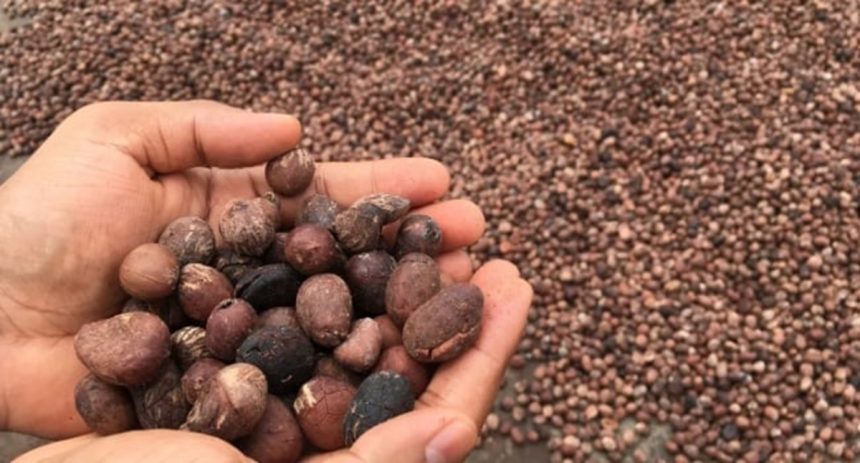The Alliance for Economic Research & Ethics LTD has cautioned the Federal Government over the recent ban on the export of unprocessed Shea nuts.
It will be recalled that President Bola Ahmed Tinubu recently issued a directive prohibiting the export of raw Shea nuts from Nigeria.
While the group commended the government’s policy direction toward Nigerian Shea nut industrialisation—which is expected to encourage local processing and add value to a potential $6.6 billion industry—it stressed the need for a well-planned implementation strategy.
“It is a positive and strategic step toward industrialisation, rural transformation, and gender empowerment,” the group said in a statement.
“However, we caution that immediate policy reversals without adequate transition measures and sector-wide consultation risk undermining ongoing commitments, investment plans, and the livelihoods of many members of our Alliance trade networks.
“We must draw attention to the potential risks of poor implementation of a good policy. We hereby seek clarification and direction from Mr. President to ensure that his good policies are not poorly executed.”
In the statement signed by the Chairman of the group, Hon. Dele Kelvin Oye, the group emphasised that the first step should be a clear communication strategy to inform stakeholders about how the policy will benefit them and how they can align with it.
“A phased implementation plan with measurable milestones and a transparent timeline can be achieved through multi-stakeholder consultation,” Oye stated.
“Information and communication from relevant government agencies regarding financing, workforce training, technical assistance, upgrading local processing facilities, and other support options are vital to avoid disruption and losses on existing local and international Shea nut contracts.
“For many exporters and processors, this six-month window is a critical phase for capital recovery and project ramp-up. For Nigeria to succeed in Shea nut industrialisation, the policy must mitigate the risk of capacity constraints and supply gaps.”
Oye further noted that, given the perishable nature of agricultural products and the country’s limited Shea nut processing capacity, the government would need to intervene by purchasing current raw outputs and unsold stock. These could then be sold to willing processors.
“The success of other countries implementing a nation-first industrialisation approach has been anchored on strong government support,” he said.
ALSO READ: FG hikes passport fees by 100%
“Government purchase support would be a welcome intervention, particularly for the informal sector, by providing robust transition support, discouraging smuggling, improving compliance, and enhancing revenue collection. It is also a profitable venture for the government.”
On international trade, Oye stated that Nigeria still intends to export processed Shea butter and related products to existing markets. Therefore, it is crucial for the country to maintain its global trade reputation and ensure a stable and predictable policy environment.
“Why do we need a phased, consultative approach? A staged timeline gives processors, exporters, and financial institutions time to invest in refining, quality control, and packaging to meet export standards. It preserves and grows existing commitments while guiding stakeholders toward higher-value activities.”
Oye referenced international case studies from Malaysia, Indonesia, and India, and cited Ghana’s phased approach to similar policy changes, which allowed producers to adjust, upgrade, and meet new standards without abruptly terminating existing engagements.
“We therefore appeal to the government to define a transition period with explicit targets for processing capacity, quality standards, and export diversification—while protecting ongoing contracts and vulnerable stakeholders in the value chain,” he urged.
The Alliance for Economic Research & Ethics LTD/GTE reaffirmed its belief in the potential of Nigeria’s Shea industry and its capacity to contribute significantly to the economy.
“However, we must approach policy changes with robust monitoring, digital market intelligence, stakeholder feedback, and multi-agency cooperation—ensuring that the interests of all stakeholders are taken into account.
“We look forward to collaborating with the government and industry partners to create a sustainable and thriving Shea sector that benefits all Nigerians,” Oye reiterated.
WATCH TOP VIDEOS FROM NIGERIAN TRIBUNE TV
- Let’s Talk About SELF-AWARENESS
- Is Your Confidence Mistaken for Pride? Let’s talk about it
- Is Etiquette About Perfection…Or Just Not Being Rude?
- Top Psychologist Reveal 3 Signs You’re Struggling With Imposter Syndrome
- Do You Pick Up Work-Related Calls at Midnight or Never? Let’s Talk About Boundaries







